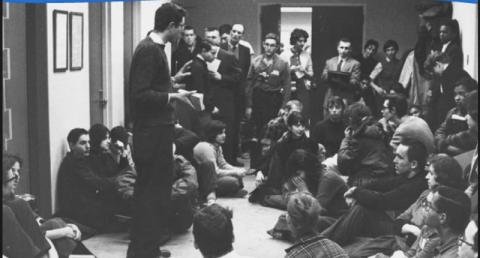- How a Washington Post Writer’s Attack on Bernie Sanders’ Civil Rights Record Completely Backfired - Adam Johnson (AlterNet)
- WWRL, Last Black-Owned Radio Station in NYC, Sold - Herb Boyd (Amsterdam News)
- Inside The Growing Social Media Skills Gap - Ryan Holmes (Fast Company)
- Why Many Kids are Leaving Social Networks - Felicity Duncan (Christian Science Monitor)
- How National Media Failed Flint - Joe Strupp (Media Matters for America)
- The DMCA is Broken for Filmmakers Like Me - Gordon Quinn and Courtney Duffy (Motherboard)
How a Washington Post Writer’s Attack on Bernie Sanders’ Civil Rights Record Completely Backfired
By Adam Johnson
February 13, 2016
Alternet
On Saturday afternoon the Washington Post’s Jonathan Capehart walked back a widely circulated “debunking” of a photo of Bernie Sanders from his days at the University of Chicago during the civil rights sit-ins of 1962. The original story, published Thursday, asserted with total certainty that the photo was not of Bernie Sanders but rather Bruce Rappaport.
But something inconvenient happened to the famed centrist pundit after the story published; the man who actually took the photo over 50 years ago came out and said he was certain it was Bernie Sanders.
WWRL,Last Black-Owned Radio Station in NYC, Sold
By Herb Boyd
February 11, 2016
Amsterdam News
It was widely rumored a few years ago that WWRL-AM 1600 had been sold. That rumor is finally a reality. “RL,” as it’s known by many of its listeners, the last Black-owned radio station in New York City, was sold to Nimisha Shukla, a pediatric physician in New Jersey. On Feb. 1, it began broadcasting to a South Asian audience.
This transaction comes on the heels of Deon Levingston being recently relieved of his duties as senior vice president and general manager at Emmis Communications, which owns WBLS and WLIB.
A group of Black New Yorkers, led by Lloyd Williams of the Greater Harlem Chamber of Commerce and the Rev. Al Sharpton, gathered after Levingston’s contract was not renewed to discuss what was happening to Black media and the various setbacks. Last week. Bob Law, the veteran media activist, moderated an event at Abyssinian Baptist Church on the disappearance of Black talk radio.
Inside The Growing Social Media Skills Gap
By Ryan Holmes
January 21, 2016
Fast Company
Businesses have overcome their earlier skepticism and raced head-on into the social arena, chasing the estimated three-quarters of consumers who now say social media influences their buying decisions. Nearly 90% of U.S. companies are currently using Twitter, Facebook, and other networks—all jockeying for their share of the estimated $1.3 trillion in value that social media stands to unlock.
There's just one small problem: The contemporary workforce is woefully ill-equipped to help companies unlock it.
Why Many Kids are Leaving Social Networks
By Felicity Duncan
February 4, 2016
Christian Science Monitor
For a few years now, alarms have been sounded in various quarters about Facebook’s teen problem. In 2013, one author explored why teens are tiring of Facebook, and according to Time, more than 11 million young people have fled Facebook since 2011. But many of these articles theorized that teens were moving instead to Instagram (a Facebook-owned property) and other social media platforms. In other words, teen flight was a Facebook problem, not a social media problem.
Today, however, the newest data increasingly support the idea that young people are actually transitioning out of using what we might term broadcast social media – like Facebook and Twitter – and switching instead to using narrowcast tools – like Messenger or Snapchat. Instead of posting generic and sanitized updates for all to see, they are sharing their transient goofy selfies and blow-by-blow descriptions of class with only their closest friends.
How National Media Failed Flint
By Joe Strupp
February 11, 2016
Media Matters for America
The water crisis in Flint, Michigan, in which thousands of residents have been exposed to everything from cancer-causing chemicals to lead in their drinking water, dates back nearly two years. But the unfolding story had received scant coverage from the national media until a month ago, when Michigan Gov. Rick Snyder (R) declared a state of emergency for Flint.
Media observers and the journalists who have been covering the story in Michigan cite a wide range of factors, including continued newsroom cutbacks, the complexities of a story that combines government mismanagement with detailed science, and competition from the presidential primary campaign, breaking news events, and click-bait like celebrity gossip.
The DMCA is Broken for Filmmakers Like Me
By Gordon Quinn and Courtney Duffy
February 14, 2016
Motherboard
The Digital Millennium Copyright Act (DMCA) was signed into law by President Clinton in 1998 as an attempt to update copyright law in accordance with the changing technology of the times. Part of the legislation, Section 1201, makes it illegal to break digital locks placed on copyrighted material, even if the intended use of the work is legal.
Filmmakers and authors have long held the right to make fair use of copyrighted material, transforming it for uses like criticism and commentary, making arguments, and providing historical context. But the DMCA made it illegal—and, in some cases, a crime—to access this content by breaking encryption. As a result, the DMCA inadvertently chills fair use and other lawful activities that are central to free expression in a democracy and the livelihoods of other filmmakers like me. In a democracy, we cannot keep culture locked up.


Spread the word